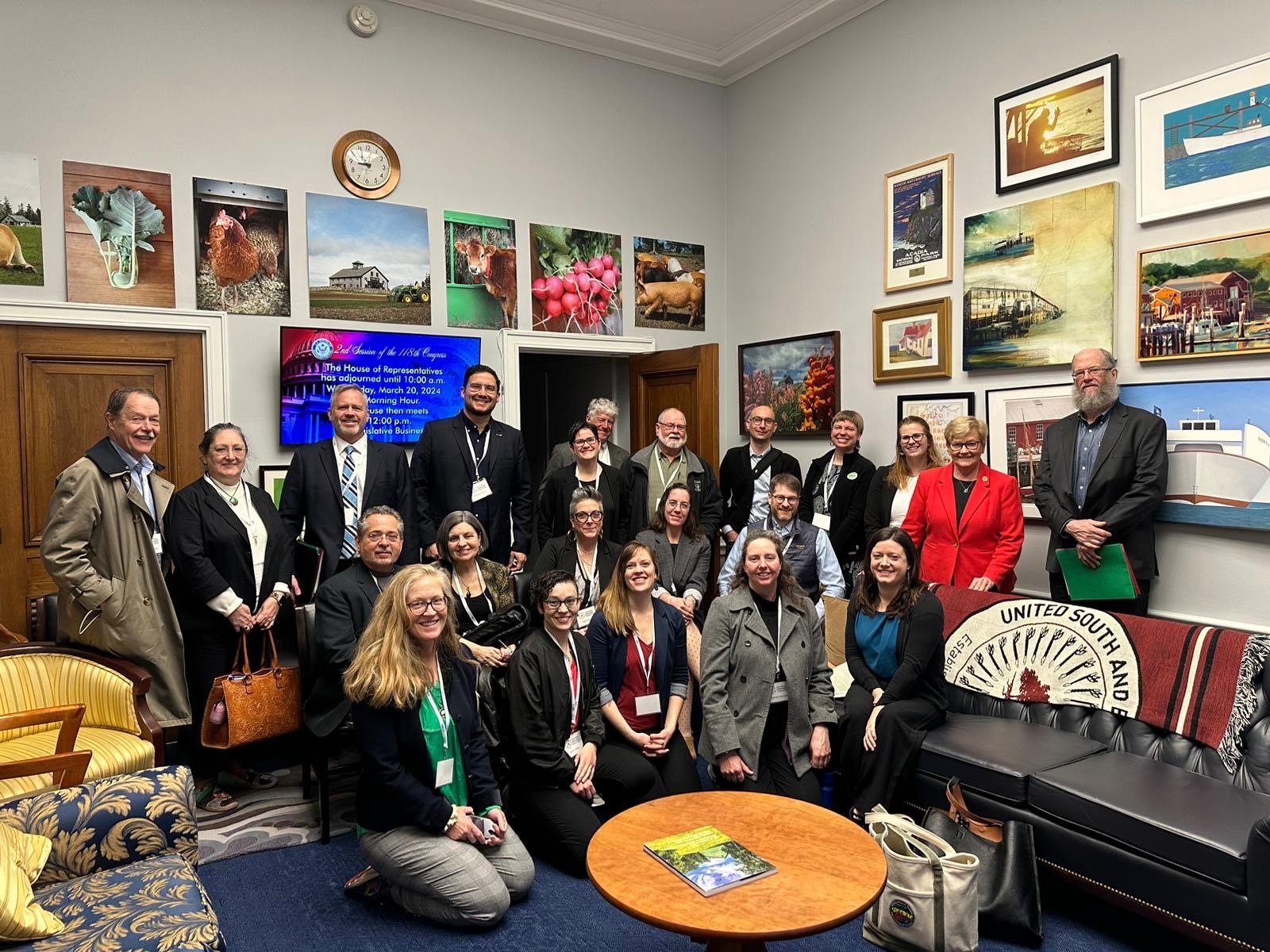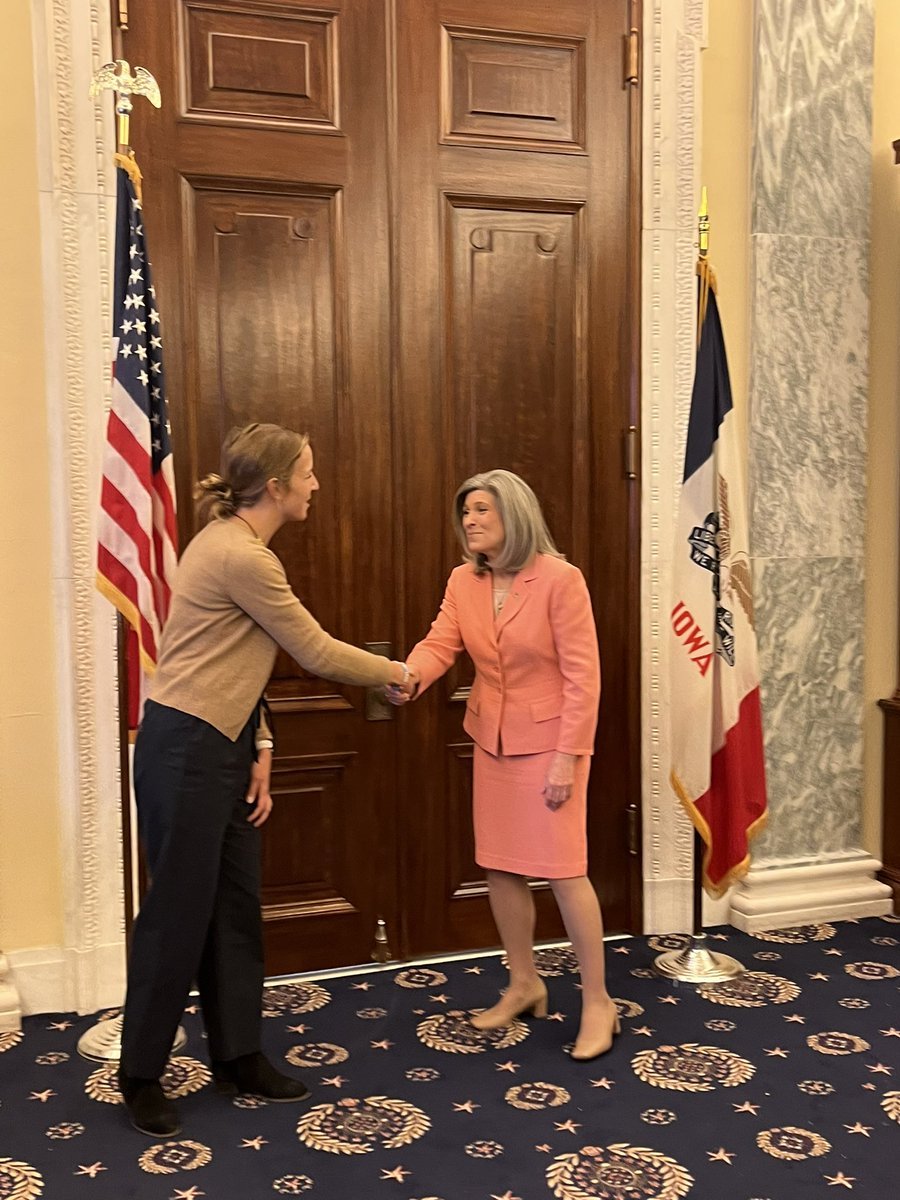Making the Case for Organic
With Members of Congress
Why engage with Members of Congress?
Members of Congress play a crucial role in shaping the future of organic by overseeing the USDA and the National Organic Program, setting policies, and controlling funding. Organic advocates should reach out to ensure strong support for organic standards, enforcement, and research—because without congressional backing, organic integrity and resources could be at risk.
Learn more about how to engage with members of congress, successful talking points, and how to build your story to make an impact here.
NOC Members meet with organic champion, Representative Chellie Pingree (Maine).
How to engage with Members of Congress
Here are some of the ways to engage with your member of Congress and/or their agriculture staffers:
Organize a Site Visit
If you own a farm or organic business, invite your member of Congress (or their in-district staff) to visit. This hands-on experience can help them understand the value of organic systems and their benefits to local economies.
Build Relationships with Agriculture Staffers
Congressional staffers often handle the details of agricultural policy. By building relationships with these staff, especially if your representative or senator serves on the Agriculture Committee, you can ensure your voice is heard. Need help identifying who to contact? Use NOC’s resource to connect with the right staffers: Form Link.
Tailor Your Message
Emphasize priorities that resonate with your representative. See the next section for suggested talking points, and please share your feedback with us to help us successfully refine messaging that works effectively!
By engaging directly and strategically, you can help promote organic as a solution that benefits both farmers and communities. 🌱
Additional resource: NOC Member Organic Farming Research Foundation (OFRF) put together a great presentation explaining how and why farmers and researchers might communicate with their legislators. You can find it here.
NOC Staff member Alice Runde meets with Senator Joni Ernst (Iowa).
L to R: Laurajean Lewis (Organic Seed Alliance), Senator Tami Baldwin (WI), Cathleen McCluskey (Organic Seed Aliance), and Manuel Gorrin (Nature’s Path), at the NOC Fly-In in March of 2024.
Key Messages
Organic agriculture offers key benefits for the people and the planet. NOC has found that the following messages resonate particularly well with Members of Congress.
Domestic organic production needs to increase to meet market demand
Demand is high: U.S. sales of certified organic products approached $70 billion in 2023, a new record for the sector. 4/5 American families buy organic food on a regular basis.(15)
American farms should feed American families. Yet, demand for organic food has outpaced domestic production so more and more organic food is coming from abroad. The U.S. imports billions of dollars of organic crops that are also grown in the U.S.(7)
Organic farmers drive rural economic growth by investing in their communities. Rural counties that have organic farming or food manufacturing hubs have lower poverty rates because the organic supply chain is more localized, keeping money within the community.(10)
Strong organic standards are the lynchpin for the organic industry
Strong organic standards and regulations ensure consumer trust in the products they are buying.
The success of the organic sector hinges on maintaining strong, clear, and fair organic standards. During the last two administrations, the USDA has made significant updates to the organic standards.
Organic rules and fraud oversight are governed by the USDA National Organic Program.
Organic farms are managed in ways that promote the health of the surrounding soil, water, and air quality.
Organic certification is a free-market solution to conservation.
Organic farms are more resilient to extreme weather events.
Organic farmers use practices that enhance soil health: crop rotations, cover cropping, composting and organic amendments, mindful tillage, avoidance of synthetic chemicals.
Extensive research studies shows organic practices and improved crop rotation can protect water quality.
Sharing your story
To make an impact with members of Congress, an effective story should be:
Personal & Relatable – Share a real experience that connects organic policy (or more generally, organic agriculture) to your local community (jobs, economy, health, etc.).
Solution-Oriented – Highlight a challenge and clearly state how the member can help (e.g., funding the National Organic Program to support oversight and enforcement of organic standards, funding organic cost-share and organic research, protecting standards, etc.).
Concise & Memorable – Keep it brief and compelling, focusing on a key message or story they can easily recall.
Backed by Facts – Pair personal stories with data or trends to reinforce credibility.
Optional: Tailor your story! Do you research about the member of congress ahead of time. What do you know about them? What committees are they on? What are recent bills they sponsored, co-sponsored, or voted on? What messages do you think will resonate with them?
A strong story makes the issue real, relevant, and actionable for lawmakers. We have heard members of congress repeat constituent stories that they heard.
Take action today!
Use NOC’s platform to send a message to your member of congress about relevant and timely action at the click of a button:



